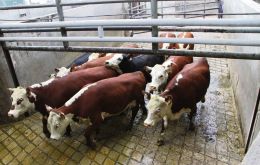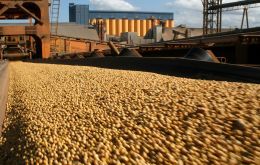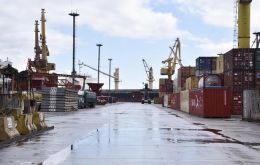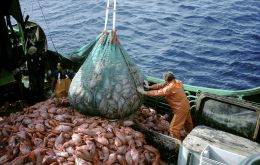MercoPress. South Atlantic News Agency
Tag: Exports
-
Tuesday, April 7th 2020 - 08:59 UTC
Argentina beef exports to the EU and China plunge

Market reports suggest that Argentine beef shipments to the European Union have reduced to almost zero amid the global coronavirus pandemic. Sales to China, the main buyer, have dropped below 2019 levels.
-
Tuesday, March 31st 2020 - 07:44 UTC
Small drop in Brazil's agribusiness exports to China in first two months of 2020

Brazil’s Agriculture and Livestock Confederation (CNA) held a live debate via Instagram on March 27 to assess the impact the coronavirus has had on exports.
-
Monday, January 13th 2020 - 09:44 UTC
Uruguay becoming a premium olive oil production and exporting country

Olive oil producers in Uruguay enjoyed a record-setting harvest in 2019, according to a new report compiled by Uruguay’s Ministry of Livestock, Agriculture and Fisheries. In effect Uruguay produced 2,775 tons of extra virgin olive oil, according to the report, an increase of more than 360% over the rolling five-year average.
-
Monday, January 13th 2020 - 09:37 UTC
Argentine farmers increased forward selling of soybeans to avoid higher export taxes

Argentina farmers increased the forward selling of soybeans in the last four months of 2019 in an effort to avoid higher export taxes that are now in effect, according to a Global Agricultural Information Network report from the U.S. Department of Agriculture.
-
Tuesday, November 19th 2019 - 08:34 UTC
Chile's GDP expands 3.3% in 3Q, but prospects for 4Q are discouraging

Chile's gross domestic product grew 3.3 percent in the third quarter of 2019 compared with a year earlier, the central bank said on Monday. The market had predicted relatively strong growth during the July through September period, citing improving prospects for the country's all-important mining industry.
-
Wednesday, October 2nd 2019 - 09:57 UTC
Mercosur and South Korea fourth round of trade talks, this time in Busan

South Korea’s trade ministry said on Monday it plans to hold the fourth round of trade talks with Mercosur as Seoul aims to expand its trade network with emerging countries and revitalize its ailing exports.
-
Thursday, September 19th 2019 - 10:12 UTC
Uruguay avoids recession, but the economy is stagnant

The Central Bank of Uruguay (BCU) released the report of the country's quarterly economic situation, which reports that the Uruguayan economy grew by only 0.1% year-on-year and 0.3% in the second quarter of the year, compared to the first three months of the year, when it registered a 0.1% drop.
-
Saturday, September 7th 2019 - 09:00 UTC
Brazil's agribusiness joins the campaign to stop rainforest fires in the Amazon

The Brazilian Amazon is facing its worst spate of forest fires since 2010, with news of the destruction of the world's largest rainforest last month prompting global outcry and worries that it could hurt demand for the country's exports.
-
Tuesday, July 23rd 2019 - 09:50 UTC
Argentine fisheries exports stable during the first half of 2019

Argentina's fish, seafood and sea shell landings increased 8.8% during the first six months of the year compared to the same period in 2018. Exports, on the other hand, slid 0.3% as did income generated, 2.9%, according to the latest release from the country's Fisheries Under Secretariat.
-
Saturday, April 27th 2019 - 10:15 UTC
US economy beats expectations and expands 3.3% in the first quarter

The US economy grew much faster than expected in the first quarter of the year, helped by a jump in exports and by firms building up stocks of goods. The economy expanded at an annualized pace of 3.2% in the January-to-March period, well above analysts' forecasts.
